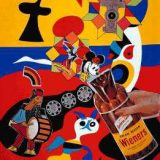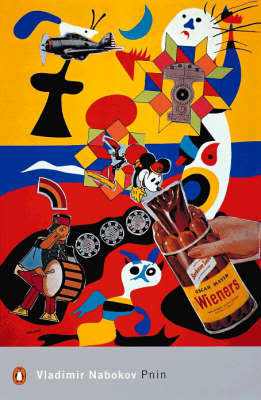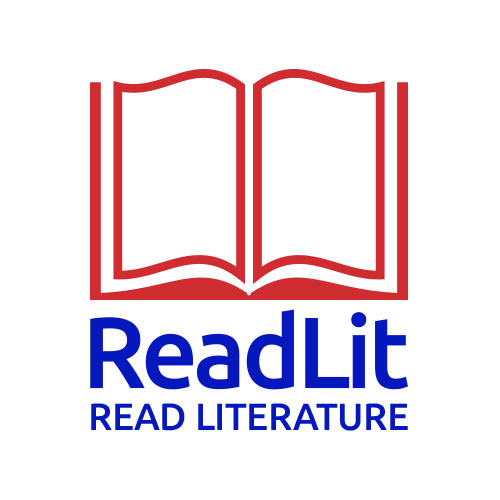Pnin – Vladimir Nabokov – 1957
The following is a compilation of discussions and reviews from the previous version of our website. We hope you enjoy these older deliberations. Just beware, there may be spoilers in here. To add your own review or remarks, please scroll down to the comment box. — ReadLit Team
Posted by Chris on 8/7/2002, 3:43:28
I just finished reading this short novella by Vladimir Nabokov and would like to recommend it to you all. It is an odd little book – more of a character study than a story – that follows an eccentric Russian emigre who is extremely loveable because of his social ineptitude.
Before stumbling across the book at a sale I had never heard of it, so I assume it’s one of Nabokov’s lesser-known works, but I enjoyed it as much as Pale Fire or Laughter in the Dark.
Has anyone else read this one? What did you think?
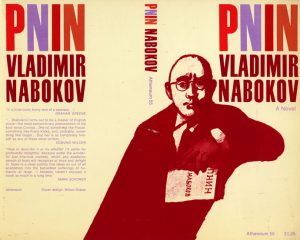
Posted by Rizwan on 8/7/2002, 22:19:23
I too admire the nutty professor “Pnin.” In fact, it is, in many ways, my favourite of Nabokov’s books. “Loveable because of his social ineptitude” is exactly right! Very funny stories. I think Nabokov wrote each chapter as an individual piece, based on a real-life Russian emigre professor he worked with at Cornell U. in upstate NY. These short stories were published individually in The New Yorker, and only later collected and released together as the book “Pnin.” This might help to explain why it seems more of a character study than a singular, unified novel.
By the way, in his collection of interviews in “Strong Opinions,” Nabokov give a very interesting explanation on the proper pronunciation of “Pnin.”
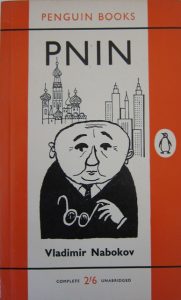
Posted by Chris on 8/7/2002, 23:58:35
Rizwan – I’ll have to find a copy of “Strong Opinions.” That sounds interesting.
Tell me, are there any other lesser-known Nabokov’s that you’d recommend? I enjoy his famous novels, but these odd novellas like Pnin and Pale Fire are my favourites. Any suggestions?
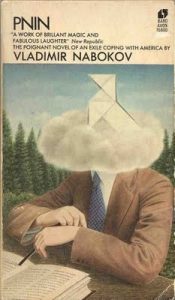
Posted by Rizwan on 9/7/2002, 1:09:20
Chris, I’m no Nabokov expert, but I would also recommend Nabokov’s “The Real Life of Sebastian Knight,” as well as many of his short stories, (fairly recently collected in one volume). As for novels I haven’t read but have heard good things about: many critics praise one of his last novels, “Ada,” as one of his greatest books. And then there are his early Russian novels like “The Defense” (centered around chess, recently made into a movie) and his early English language novel “Bend Sinister,” which I’ve also heard great things about.
There are also three collections of Nabokov lectures that I have found to be, not only informative, but also highly entertaining and enlightening. Who better to talk about literary classics than the author of so many classics himself? Try his “Lectures on Literature,” where he covers Austen’s “Mansfield Park,” Dickens’ “Bleak House,” Flaubert’s “Madame Bovary,” Kafka’s “Metamorphosis,” Joyce’s “Ulysses” and Proust. Then, in his Lectures on Russian Literature, he discusses, and even ranks, the work of all the great 19th century Russian novelists (Warning: if you are a fan of Dostoyevsky, be prepared for some not so subtle jabs at his books. Tolstoy, Turgenev, Chekhov, and Gogol all far outclass Dostoyevsky in Nabokov’s opinion). Finally, in reading “Don Quixote” (which I have to admit, I haven’t quite finished as yet), while the Man of La Mancha had Sancho Panza to accompany him on his journey through the book , I had Vladimir Nabokov to accompany me, by way of his “Lectures on Don Quixote.” I can’t say I agree with everything he says in each of these lectures, but I each of them is definitely worth reading, if only to get some insight into Nabokov and his art.
One last note: you may also want to check out his remarkable memoirs called “Speak, Memory” if you haven’t already. Definitely a classic. –Rizwan
——
Posted by Stephen Hill on 9/7/2002, 10:15:32
If you like Nabokov at his most playful another two novels you might like are two of his early novels written in Russian – “Despair” and “Invitation to a Beheading”.
‘Despair’ with the histrionic Hermann Hermann (a possible early predecessor to Humbert Humbert) was the first Nabokov novel I read, and it certainly encouraged me to check out his later novels.
Invitation to a Beheading, was another of his early novels – with its Gogolian overtones it is almost reminiscent of Kafka. Interestingly enough some reviewers at the time compared this novel with Kafka’s ‘The Trial’, which Nabokov at the time had not read. After reading ‘The Trial’ Nabokov apparently took this comparison as a complement.

Posted by Michael Sympson on 9/7/2002, 16:11:51
“Pnin” is indeed a lovely novel, but to my knowledge neither an episodic rehash of a series of short stories nor actually a “short” novel: most novels by Nabokov are actually even shorter.
“Pnin” is rather well constructed and coherent if you look in the right places. Personally I think it is Nabokov’s best novel in English. Better than Lolita, better than Bent Sinister.
Of the Russian lot (I think I have read all of his novels) I like to think that “Glory” is his most polished accomplishment.
Michael
——-
Posted by Rizwan on 9/7/2002, 20:19:49
“Pnin” is indeed a lovely novel, but to my
knowledge neither an episodic rehash of a
series of short stories nor actually a
“short” novel…”Pnin” is rather well constructed
and coherent if you look in the right places.
Michael, rather than take my word for it, then (as I said, I’m no Nabokov expert, merely an admirer), here is an excerpt of a June 1953 letter from Nabokov to the critic Edmund Wilson, in which he writes that he has “started a series of stories about a creature of [his], a Professor Pnin.” (“The Nabokov-Wilson Letters;” Harper, p. 282)
The individual chapters are clearly linked, thematically and otherwise, and so “Pnin” is certainly a novel; describing it as more of a character study and less as a coherent story, as Chris did, in no way suggests otherwise. But the fact remains that the book was first published in serialised form in The New Yorker, and so the episodic nature of its publication–and apparently Nabokov’s conception of “Pnin” as well, judging from the Wilson letter– might explain why many feel the way Chris did about the book.
As for whether the book is “short” or not, I don’t know that Chris meant this solely as a reference to the length the book. As I remember, “Pnin” is full of the word-play and other puzzles characteristic of Nabokov. But I don’t believe it is carried out to the same extent as it is in, say, “Lolita” or “Pale Fire.” In this respect, “Pnin” is a shorter, more lightweight novel by comparison.
In any case, I share completely the admiration you have for the book. –Rizwan
Your comments are very welcome. Please sign in and use the contribute box below to write a review or to add your comments. You may also enjoy our Talk Literature page for active discussions.


